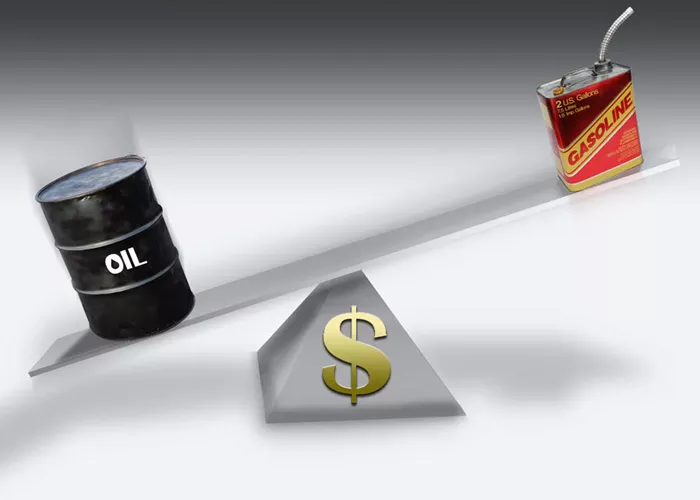Crude oil and gasoline are important for the global economy. Many people wonder if crude oil prices affect gasoline prices. The simple answer is yes, but the relationship is complex. Crude oil is the main raw material for gasoline. When crude oil prices go up, gasoline prices usually follow. However, other factors also influence gasoline prices, such as refining costs, transportation, taxes, and market demand.
In this article, we will explain how crude oil and gasoline prices are linked. We will also explore the factors that cause price differences and why gasoline prices do not always move in the same way as crude oil prices.
What Is Crude Oil?
Crude oil is a natural resource found underground. It is a thick, dark liquid made of hydrocarbons. Crude oil is extracted from the earth and refined into different fuels, including gasoline, diesel, and jet fuel. The price of crude oil depends on supply and demand, geopolitical events, and production levels set by oil-producing countries.
What Is Gasoline?
Gasoline is a fuel made from crude oil. It is used mainly in cars and other vehicles. After crude oil is extracted, it is sent to refineries. Refineries process crude oil and separate it into different products. Gasoline is one of the most valuable products from refining. The price of gasoline depends on crude oil prices, refining costs, distribution, taxes, and demand from consumers.
How Are Crude Oil and Gasoline Prices Connected?
Crude oil and gasoline prices are strongly connected because crude oil is the main ingredient in gasoline. When crude oil prices rise, refiners pay more to produce gasoline. This cost is usually passed on to consumers. However, the connection is not always direct. Sometimes, gasoline prices can rise even if crude oil prices remain stable.
1. Crude Oil as the Raw Material for Gasoline
Since gasoline is made from crude oil, its price is affected by changes in crude oil prices. If crude oil becomes expensive, producing gasoline also becomes costly. This leads to higher gasoline prices.
2. Supply and Demand Impact Prices
Both crude oil and gasoline follow supply and demand rules. If there is a shortage of crude oil, prices rise, which affects gasoline prices. Similarly, if there is high demand for gasoline, its price can increase even if crude oil prices stay the same.
3. Refining Costs Add to Gasoline Prices
Refining crude oil into gasoline is expensive. Refineries use complex processes to convert crude oil into usable fuel. If refining costs increase due to maintenance, equipment failures, or new environmental regulations, gasoline prices will also rise.
4. Distribution and Transportation Costs
Gasoline must be transported from refineries to gas stations. This requires pipelines, trucks, and ships. If transportation costs rise due to fuel prices or infrastructure issues, gasoline prices will increase, even if crude oil prices remain steady.
5. Government Taxes Affect Gasoline Prices
Taxes are a big part of gasoline prices. Different countries and states have different tax rates on fuel. Even if crude oil prices drop, gasoline prices may not fall if taxes are high.
6. Seasonal Changes Influence Gasoline Prices
Gasoline prices change with the seasons. In summer, demand for gasoline increases because people travel more. This leads to higher prices. In winter, demand decreases, so prices may go down. However, crude oil prices do not always follow this pattern.
Why Don’t Gasoline Prices Drop as Fast as Crude Oil Prices?
Many people notice that when crude oil prices fall, gasoline prices do not drop as quickly. There are several reasons for this:
- Refineries and Retailers Adjust Slowly: When crude oil prices fall, refiners and gas stations take time to adjust their prices. They may wait to see if the price drop is permanent.
- Supply Chain Delays: Gasoline sold at gas stations comes from crude oil bought weeks or months earlier. Even if crude oil prices drop today, it takes time for the change to reach consumers.
- Market Competition: Gas stations set their prices based on local competition. If one station lowers its prices, others may follow, but it takes time.
What Causes Gasoline Prices to Rise Even When Crude Oil Prices Low?
Sometimes, gasoline prices rise even when crude oil prices are stable or falling. This can happen due to:
- Refinery Issues: If a major refinery shuts down for maintenance or an accident, gasoline supply decreases, causing prices to rise.
- Hurricanes and Natural Disasters: Storms and disasters can disrupt oil production and refining, leading to higher gasoline prices.
- Geopolitical Events: Political tensions, wars, or sanctions on oil-producing countries can cause uncertainty, pushing gasoline prices up.
- High Demand Periods: In summer or holiday seasons, more people drive, increasing demand for gasoline and raising prices.
Historical Examples of Crude Oil and Gasoline Price Changes
There have been many times when crude oil and gasoline prices moved together, and other times when they did not:
- 2008 Oil Price Spike: Crude oil prices reached $147 per barrel in July 2008. Gasoline prices also hit record highs.
- 2014 Oil Price Crash: Crude oil prices fell from $100 per barrel to below $50 per barrel. Gasoline prices dropped but not as fast as crude oil prices.
- 2020 Pandemic Impact: During the COVID-19 pandemic, crude oil prices fell sharply as demand collapsed. Gasoline prices also fell, but some areas saw slower price reductions due to supply chain issues.
Conclusion
Crude oil and gasoline prices are closely linked, but the relationship is not always straightforward. Crude oil is the primary raw material for gasoline, so its price has a direct impact. However, other factors such as refining costs, taxes, transportation, and market demand also play a role. This is why gasoline prices do not always move in perfect sync with crude oil prices.
Understanding these connections can help consumers, businesses, and policymakers make better decisions. While crude oil prices are an important indicator, other factors must also be considered when predicting gasoline prices.

